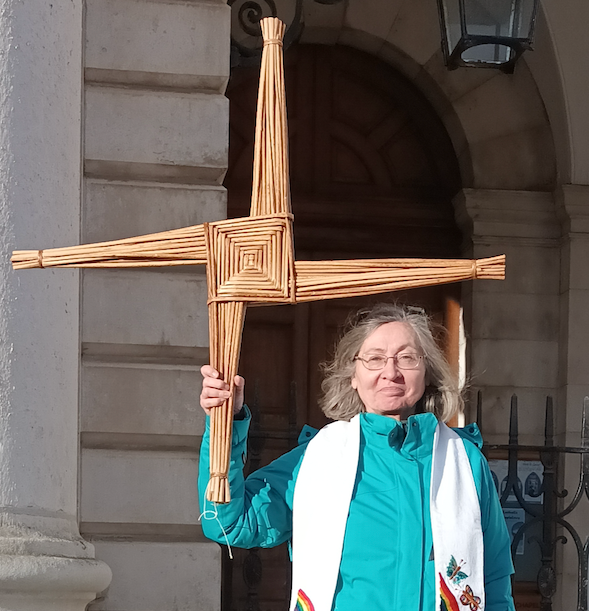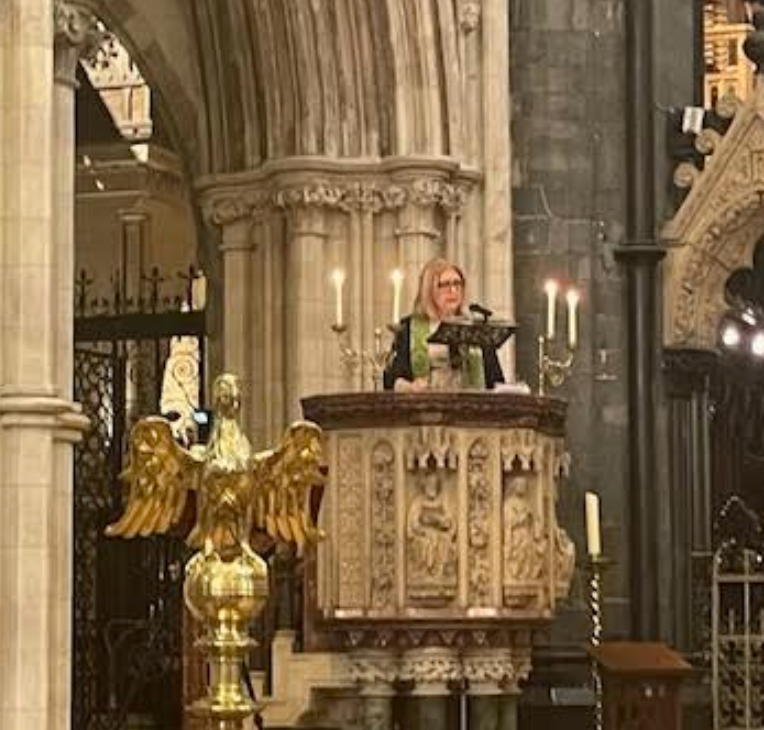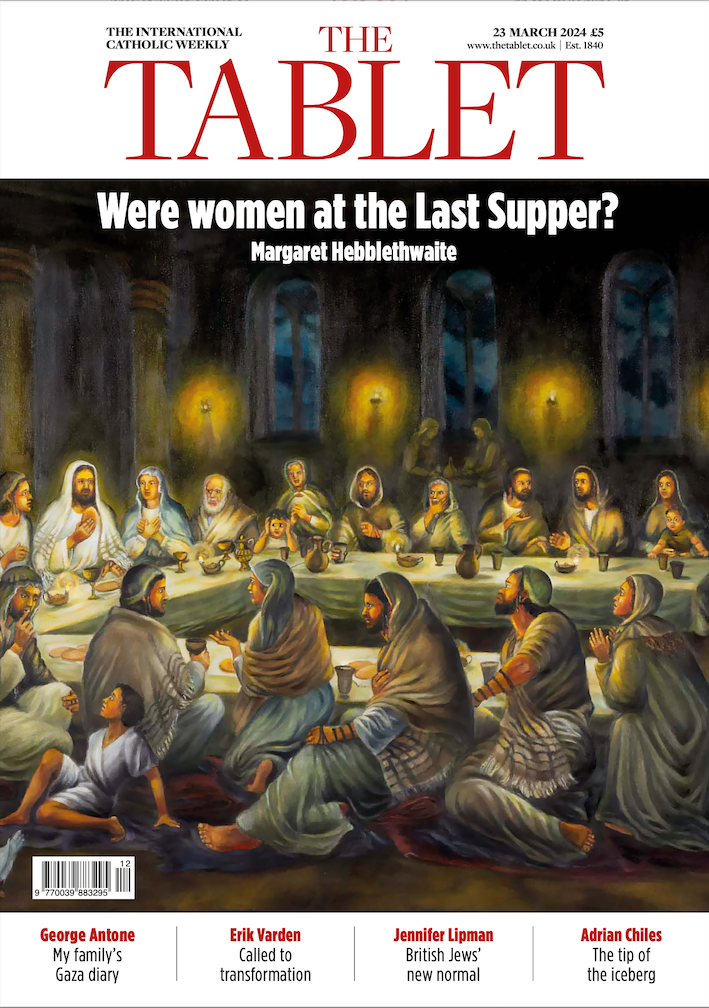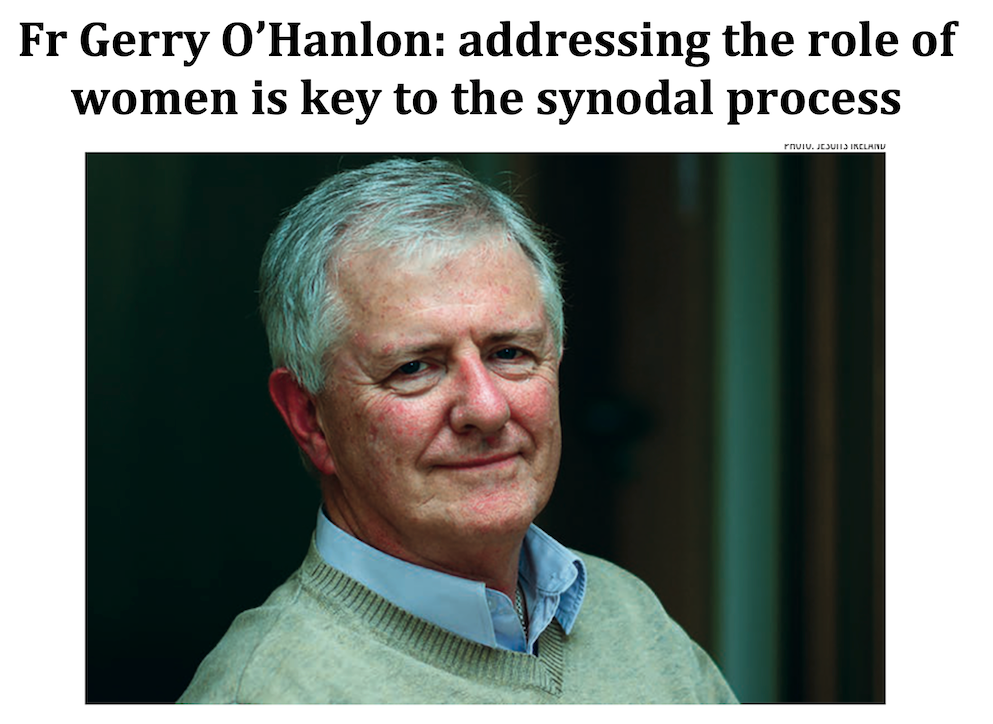How Cardinal Ratzinger in 2001 as Head of the CDF tried (and failed!) to block the First Women's Ordination Worldwide conference in Dublin
The sisters who refused to obey

Few stories delight the human heart as much as those of the bully faced down
Patsy McGarry; The Irish Times; 4 August 2001
Few stories delight the human heart as much as those of the bully faced down. David and Goliath, St George and the dragon, and the three little pigs have thrilled generations. And now there's the story of Joan of Erie to add to that inspiring list of courage beating all.
Once upon a time, and not so very long ago, there was a nun who lived in a wood. Her name was Joan and she wrote many books about trees, while never losing sight of the wood.
These brought her great acclaim. One day, however, a giant, who said he owned the wood, warned her against writing - even speaking - about one tree. He wanted to keep it to himself and said that if she spoke about it to anyone, he would throw her out of the wood, where she had lived all her life.
But she believed the people had a right to know about this very special tree. It was a particularly beautiful part of God's creation, she felt. Besides, she really didn't believe the giant had any right to stop her. She said so. She said she was going to tell everyone about it
And he huffed and he puffed and he threatened to blow her whole world away.
She reviewed the situation, as one must when dealing with giants. She decided he was wrong and a bully. She even questioned whether the wood really belonged to him at all. So she went to where the people had gathered and told them about the tree and what the giant had threatened, and said: "The wood belongs to us all. God made it for everyone." And they were delighted.
Then they sat back to see what the giant would do. Nothing happened.
And nothing happened again. Then they decided to ask the giant if he intended doing anything at all. And he replied " Me?" They reminded him of his threats to Joan if she even spoke about the tree.
He replied " Me! I would not say such a thing. That is not what I meant at all. It was a complete misunderstanding." But they knew he had been persuaded by their number and recognised him for the bully he was. They left him simpering there and lived happily in their wood ever after.
They were unlikely revolutionaries, those women who gathered in Dublin a month ago to discuss the forbidden subject of women's ordination in the Catholic Church. All 345 of them, from 27 countries, including 30 nuns.
Most were middle-aged and older. Blue-rinse rebels and their dame, Sister Joan Chittister, a Benedictine nun from Erie in Pennsylvania.
It was a miracle they were there at all. The Vatican had done all in its power to scupper what was to be the first international conference on women's ordination in the Catholic Church. It was organised by the Women's Ordination Worldwide (WOW) group and held in the O'Reilly Hall, UCD by the Irish group, Brothers And Sisters In Christ (BASIC) from June 29th to July 1st.
That the Vatican should try to suppress it no longer surprises anyone. And that it should resort to medieval methods is, sadly, increasingly a feature of these twilight years of a papacy which has become calcified and brittle.
Then, when it was all over, Vatican spokesman Dr Joaquin Navarro-Valls said no action would be taken against the two nuns threatened with dismissal if they attended. Explaining Rome's earlier position, he said it was felt "inopportune" for the two religious to take part "because of the possibility of outside manipulation". And that was that. But it hardly seems right that the Vatican feels free to subject people to such treatment. Were it a civil institution, it would be brought before the courts for such behaviour. And rightly so.
In May, 1994, Pope John Paul issued Ordinatio Sacerdotalis, which said the Church had no authority to ordain women. This was followed in November 1995 by the letter, Responsum ad Dubium, signed by the prefect of the Congregation of the Doctrine of the Faith, Cardinal Joseph Ratzinger.
It said Church teaching on the issue of women priests required "definitive assent" and ordered all discussion on it to stop. It said Ordinatio Sacerdotalis was now part of the Church's body of infallible teaching. In 1998, the Pope's apostolic letter, Ad Tuendam Fidem, said those who continued to discuss women's ordination in the Church were effectively excommunicating themselves.
But the discussion continued, albeit in a climate of fear. BASIC, which campaigns for the ordination of women in the Catholic Church, has continued to hold gatherings in Ireland. At one such meeting attended by this reporter, people, including priests, asked that their names not be published because they were afraid of the consequences. There were similar requests at the recent Dublin conference.
Indeed, according to the conference organisers, many members of BASIC did not attend the conference for fear of losing their contracts as chaplains in hospitals and schools.
These fears were not groundless as the Vatican has taken an extremely hard line on the issue. In January of last year, one of Britain's best known nuns, author and broadcaster Dr Lavinia Byrne, left her order, the Institute of the Blessed Virgin Mary, after 35 years, following 18 months of "relentless pressure" from the Vatican.
In 1993, she published the book Women at the Altar, which approved of women priests. In 1998, it was reprinted in the US and the local bishop in Minnesota intervened, whereupon it was warehoused and/or burned, she was told.
And the Vatican began to lean on her superior in Rome to get her to recant.
She never saw the Vatican's correspondence with her superior, Sister Annunciata. She was told it would be "too painful for me to see". She left the order to spare it from further Vatican pressure.
It is the Vatican way. The World Council of Churches (WCC) instructed one of its officials in Geneva, Aruna Gnanadason, to withdraw as keynote speaker from the recent Dublin conference. Gnanadason co-ordinates the WCC's Justice, Peace and Creation body and has special responsibility for its women's programme.
Unofficially, the Dublin conference organisers were told this was because the Vatican threatened to withdraw from commissions involving the WCC if she did so. In May this year, a disappointed Gnanadason withdrew, sending her script instead. Her planned appearance as keynote speaker had been advertised in pre-conference material as far back as August 2000.
The Vatican also chose not to move until very late in the day over the participation of the two other key conference figures. Benedictine nun Sister Joan Chittister was due to address it on Saturday, June 30th, and the conference co-ordinator was Sister Myra Poole. Both were instructed by the Vatican, through their superiors, not to attend.
But in taking on those two nuns, the Vatican got more than it bargained for. On March 20th, its Congregation for the Institutes of the Consecrated Life wrote to Sister Christine Vladmiroff, prioress of the Benedictine Community at Erie, Pennsylvania, where Sister Joan Chittister lives. The letter advised the prioress to forbid Sister Joan to attend the conference, threatening "just penalties" if she did attend. The latter, from canon 1371 of the Church's 1983 Code of Canon Law, generally means dismissal from religious orders.
Sister Christine requested a meeting in Rome, which took place on May 28th last. There, the earlier injunction was repeated.
Back in the US, the nuns discussed the situation. Sister Joan said she felt it was for the good of the church that discussion take place and that she would attend the conference. This message was conveyed to Rome, which rejected it.
Sister Christine refused to enforce the relevant "just penalties" against Sister Joan, who has been a member of the order for 50 years.
Further, she wrote to the Vatican explaining why she could not do so. The letter was signed by all but one of the 128 active nuns in the Erie community.
Thirty-five of the younger nuns in the community also signed a statement asking that any sanction imposed on Sister Joan for going to Dublin be imposed on them too.
Meanwhile, Sister Myra Poole had also been summoned from London, along with her Notre Dame de Namur superior in Rome, to the Vatican at the end of May. There they were told Sister Myra was not to attend the conference and that if she did, she was to receive "just penalties". There were three follow-up letters from the Vatican, extracts from which, only, were shown to Sister Myra.
In this case, however, her superior gave in to Vatican pressure and issued the relevant precept on (approximately) June 20th. It threatened Sister Myra with dismissal from the order - to which she had belonged for 42 years - if she went to Dublin.
At one stage she agreed not to go to Dublin, but later changed her mind.
On Saturday, June 30th, as scheduled, Sister Joan gave a feisty address to a delighted conference. "To preach a theology of equality - to say that all persons are equal in God's sight - and at the same time to maintain a theology of inequality, a spirituality of domination in the name of God, that says that women have no place in the dominion of the Church and the development of doctrine, is to live a lie," she said.
"How can a Church such as this call convincingly to the world, in the name of justice, to practice a justice it does not practice itself?" she asked. "The church that preaches the equality of women but does nothing to demonstrate it in its own structures - that proclaims a theology of equality but insists on an ecclesiology of superiority - is out of synch with its best self and dangerously close to repeating the theological errors that underlay centuries of Church-sanctioned slavery," she said.
At a press conference later, she emphasised that what she was doing was for the good of the Church and not in defiance. It was a plea to the Church based on the gospel, not a challenge, she said, "but the first question we ask is 'why can't we question?'".
Meanwhile, Sister Myra Poole had not appeared at the conference at all, though she was known to be in Dublin. Sources indicated she was in turmoil about what to do. Then, that Saturday afternoon, she appeared in the hall.
The Church was "in grave error on the issue of women priests", she said, adding that she would never leave the Church or her community. On Sunday morning, July 1st, she lit the candle to begin proceedings.
Approached by this reporter afterwards, it was clear she was very distressed, and reluctant to discuss her situation. She agreed she might talk later, but left. Doorstepped that afternoon, she said she might issue a statement two weeks later when she had discussed things with her order. It did not happen. At 68 years of age, with a lifetime's service to the Church behind her as teacher and school principal, it seemed the harshest cruelty that someone such as her should be made to endure so much.
The conference itself was a great success as far as organisers and delegates were concerned. One nun, who is a hospital chaplain and who believes she has a vocation to the priesthood, sent a bouquet of flowers to the organisers afterwards, thanking them. She explained: "When I first came on Friday, I was afraid who might see me there. By Sunday, I didn't care any more, I was no longer afraid." A grandmother (Irish) in her late 70s sent them a thank-you card with the words: "I think every woman left the conference with her head held high." Another woman told them: "There was a meeting called for all the women who have a vocation to the priesthood and who were willing to acknowledge it publicly. The amazing thing is that when I got there, I found the room was actually too small, so many were there, from so many different countries!"
Afterwards, Soline Vatinel of BASIC contrasted the determination and alacrity with which the Vatican had acted to destroy the conference with its handling of the paedophilia problem in the Church.
She asked whether any priest or religious convicted of abusing children had ever even been threatened with dismissal or automatic excommunication for their offence. "As we have seen, when they want to move (on an issue), they can move. But it seems it's a greater crime to discuss the ordination of women," she said.
On this feast day of St Jean Marie Vianney, patron saint of parish priests, let us salute those women who despite the temptation of easeful retirement had the courage of their convictions and proved once more that there is nothing to fear but fear itself.
Regardless of views on the issue of women priests within the Church, they have done all Catholics a service by standing up to what Nobel Peace prize-winner Mairead Corrigan Maguire described to the conference as "spiritual abuse" by Rome. The inquisition is alive and well there, Soline Vatinel told the conference. Maybe. Maybe not. But, if so, Sister Joan, her community and Sister Myra have proven its writ does not run far.
For that, let us all be grateful. Not least to them.
Patsy McGarry
The Irish Times
4 August 2001












